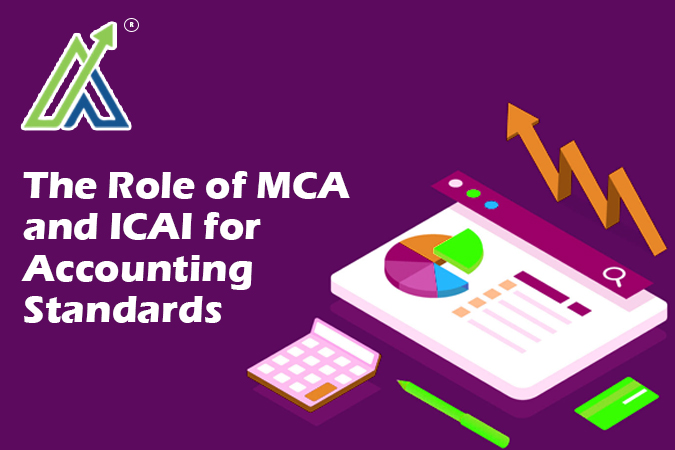In financial statements, accounting standards are the strength for transparency, regularity, and credibility in India. For the regulation, implementation, and formation of accounting standards, the compulsory rules are played by the Ministry of Corporate Affairs (MCA) and the Institute of Chartered Accountants in India (ICAI). This blog will provide information regarding how these two, i.e., MCA and ICAI, contribute to the stability of India’s regulatory architecture for accounting standards.
Ministry of Corporate Affairs
The Ministry of Corporate Affairs is considered the zenith for the management of corporate affairs in India. It lets companies follow the statutory requirements and required company laws. Here is the impact of MCA on the implementation of accounting standards. –
Regulatory Power:
The MCA sets the rules. It has the authority to prescribe accounting standards under the Companies Act, 2013. This ensures uniformity in financial reporting.
Issuing Notifications:
Notifications to apply or modify accounting standards are often issued by the MCA. To keep up with international standards, they occasionally implement International Financial Reporting Standards (IFRS).
Collaboration with ICAI:
The MCA works with the ICAI to develop and review standards. This collaboration makes sure the standards are practical and applicable.
Monitoring Compliance:
Through the Registrar of Companies (ROC), the MCA ensures companies follow the standards. In cases of non-compliance, penalties and legal action can be taken.
Institute of Chartered Accountants of India (ICAI)
The ICAI is a statutory body that regulates the Chartered Accountants profession in India. Here’s how ICAI contributes to accounting standards:
Drafting Standards:
The ICAI’s Accounting Standards Board (ASB) drafts accounting standards. These drafts are reviewed and recommended to the MCA.
Consultative Approach:
The ICAI involves stakeholders like industry experts and academicians in the drafting process. This makes the standards comprehensive and practical.
Updating Standards:
The ICAI keeps the standards up-to-date with changes in the business world and international practices. This ensures relevance and competitiveness.
Training and Guidance:
The ICAI educates Chartered Accountants and others through training programs and seminars. They also issue guidance notes to help with the interpretation and application of standards.
Quality Reviews:
The ICAI’s Financial Reporting Review Board (FRRB) reviews financial statements to ensure they comply with the standards.
MCA and ICAI Working Together
The MCA and ICAI work hand-in-hand to ensure effective implementation and regulation of accounting standards in India. Their teamwork ensures:
Coherent Standards: Joint efforts lead to consistent application across the corporate sector.
Stakeholder Trust: Reliable financial reporting builds trust among investors and the public.
Global Alignment: By adopting international standards, they make sure Indian practices align with global norms.
Questions to Understand your ability
Ques1: Which authority in India has the statutory power to prescribe accounting standards under the Companies Act, 2013?
- Reserve Bank of India (RBI)
- Ministry of Corporate Affairs (MCA)
- Securities and Exchange Board of India (SEBI)
- Institute of Chartered Accountants of India (ICAI)
Ques2: Which body is responsible for drafting accounting standards in India?
- Reserve Bank of India (RBI)
- Ministry of Corporate Affairs (MCA)
- Securities and Exchange Board of India (SEBI)
- Institute of Chartered Accountants of India (ICAI)
Ques3: How does the MCA enforce compliance with accounting standards?
- Through the Reserve Bank of India (RBI)
- By issuing guidelines to banks
- Via the Registrar of Companies (ROC)
- By conducting surprise audits
Ques4: What is one of the roles of the ICAI’s Financial Reporting Review Board (FRRB)?
- Drafting tax laws
- Reviewing financial statements for compliance
- Issuing banking licenses
- Regulating stock markets
Ques5: Which international standards does the MCA sometimes adopt to align with global practices?
- Generally Accepted Accounting Principles (GAAP)
- International Financial Reporting Standards (IFRS)
- International Auditing Standards (IAS)
- Basel III norms
Conclusion
In India, the MCA and ICAI are at the core of the regulatory framework concerned with accounting standards. The MCA gives the regulatory overviews, and ICAI makes sure that these standards are workable and updated accordingly. These two institutions thus ensure adequate transparency, reliability, and consistency of financial reporting—and that the practices agree with those elsewhere in the world. It is, therefore, this kind of collaboration that makes much difference in keeping a neat economic environment conducive to growth and investment.
FAQ’s
The MCA sets and enforces accounting rules under the Companies Act, 2013, making sure everyone follows the same playbook.
The MCA, through the ROC, keeps an eye on compliance and can slap penalties for breaking the rules.
The ICAI’s ASB drafts the standards and then passes them on to the MCA.
The ICAI brings in industry experts and academics to make the standards solid and practical.
To keep Indian accounting in sync with global standards and stay relevant internationally.
The ICAI runs training programs, seminars, and gives guidance to keep Chartered Accountants and others in the loop about the standards.
They team up to develop, review, and enforce standards, making sure everyone plays by the same rules.
They team up to develop, review, and enforce standards, making sure everyone plays by the same rules.
Their work together makes sure that financial reports are accurate, builds trust, and brings Indian methods in line with those around the world.

